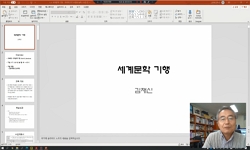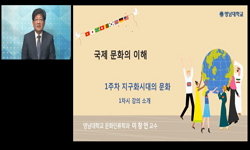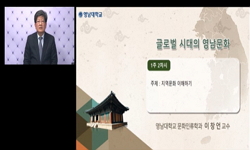In the present essay, the author first dates the origin of cosmopolitanism,one of the cutting edge theoretic topics in current international academia, in comparison with its practice in China and the West, and offers his own reconstruction of this con...
http://chineseinput.net/에서 pinyin(병음)방식으로 중국어를 변환할 수 있습니다.
변환된 중국어를 복사하여 사용하시면 됩니다.
- 中文 을 입력하시려면 zhongwen을 입력하시고 space를누르시면됩니다.
- 北京 을 입력하시려면 beijing을 입력하시고 space를 누르시면 됩니다.
부가정보
다국어 초록 (Multilingual Abstract)
In the present essay, the author first dates the origin of cosmopolitanism,one of the cutting edge theoretic topics in current international academia, in comparison with its practice in China and the West, and offers his own reconstruction of this controversial concept. The term “cosmopolitanism” is made up by two parts: cosmos comes from the Greek word Kórμo‰, meaning the Universe, and polis comes from Póki‰,meaning city. The two parts put together forms a new word meaning world city or state. Those who believe in its moral standard are called “cosmopolites,” and their claim and theoretic doctrine is thus called “cosmopolitanism.”Then he deals with the internationalizing process of modern Chinese literature with regard to cosmopolitanism. To the author, from a literary point of view, in China’s recent past, to talk about cosmopolitanism was nothing but to identify Chinese literature with Western literature by translating as much Western literature as possible into Chinese. But now with the advent of globalization, the rapid development of Chinese economy,and Mo Yan’s Nobel Prize winning in Literature in 2012, it is the right time to internationalize Chinese literature. Therefore cosmopolitanism has once again become significant to China, its literature and culture.
참고문헌 (Reference)
1 Wang, Ning, "World Literature and the Dynamic Function of Translation" 71 (71): 1-14, 2010
2 Damrosch, David, "What is World Literature?" Princeton UP 2003
3 Fokkema, Douwe, "Towards a New Cosmopolitanism" 3 : 1-17, 1999
4 Wang, Ning, "Reconstructing (Neo)Confucianism in ‘Glocal’ Postmodern Culture Context" 37 (37): 48-62, 2010
5 Morrison, Donald, "Holding Up Half The Sky"
6 Nussbaum, Martha, "For Love of Country: Debating the Limits of Patriotism" U of Chicago P 1996
7 Cheah, Pheng, "Cosmopolitics: Thinking and Feeling beyond the Nation" U of Minnesota P 1998
8 Appiah, Kwame A, "Cosmopolitanism: Ethics in a World of Strangers" Norton 2006
9 Calhoun, Craig, "Cosmopolitanism and Nationalism" 14 (14): 427-448, 2008
10 Beck, Ulrich, "Cosmopolitan Europe" Polity 2007
1 Wang, Ning, "World Literature and the Dynamic Function of Translation" 71 (71): 1-14, 2010
2 Damrosch, David, "What is World Literature?" Princeton UP 2003
3 Fokkema, Douwe, "Towards a New Cosmopolitanism" 3 : 1-17, 1999
4 Wang, Ning, "Reconstructing (Neo)Confucianism in ‘Glocal’ Postmodern Culture Context" 37 (37): 48-62, 2010
5 Morrison, Donald, "Holding Up Half The Sky"
6 Nussbaum, Martha, "For Love of Country: Debating the Limits of Patriotism" U of Chicago P 1996
7 Cheah, Pheng, "Cosmopolitics: Thinking and Feeling beyond the Nation" U of Minnesota P 1998
8 Appiah, Kwame A, "Cosmopolitanism: Ethics in a World of Strangers" Norton 2006
9 Calhoun, Craig, "Cosmopolitanism and Nationalism" 14 (14): 427-448, 2008
10 Beck, Ulrich, "Cosmopolitan Europe" Polity 2007
11 Englund, Peter, "Chinese Writer Mo Yan Wins Nobel Prize"
12 Fokkema, Douwe, "Chinese Postmodernist Fiction" 69 (69): 141-165, 2008
13 Brennan, Tim, "At Home in the World: Cosmopolitanism Now" Harvard UP 1997
동일학술지(권/호) 다른 논문
-
Border Wars: Translation and Convergence in Politics and Media
- 한국영어영문학회
- ( W J T Mitchell )
- 2013
- KCI등재,SCOPUS
-
The Body Luminous: The Changing Status of Literature in Korea?and the Modern World
- 한국영어영문학회
- ( Uc Hang Kim )
- 2013
- KCI등재,SCOPUS
-
Cosmopolitanism, World Literature and Chinese Literary Practice
- 한국영어영문학회
- ( Ning Wang )
- 2013
- KCI등재,SCOPUS
-
- 한국영어영문학회
- ( Rajeev S Patke )
- 2013
- KCI등재,SCOPUS
분석정보
인용정보 인용지수 설명보기
학술지 이력
| 연월일 | 이력구분 | 이력상세 | 등재구분 |
|---|---|---|---|
| 2022 | 평가예정 | 계속평가 신청대상 (등재유지) | |
| 2017-01-01 | 평가 | 우수등재학술지 선정 (계속평가) | |
| 2014-10-08 | 학회명변경 | 영문명 : 미등록 -> The English Language and Literature Association of Korea |  |
| 2013-01-01 | 평가 | 등재학술지 유지 (등재유지) |  |
| 2010-01-01 | 평가 | 등재학술지 유지 (등재유지) |  |
| 2008-01-01 | 평가 | 등재학술지 유지 (등재유지) |  |
| 2006-01-01 | 평가 | 등재학술지 유지 (등재유지) |  |
| 2005-10-14 | 학술지등록 | 한글명 : 영어영문학외국어명 : The Journal of English Language and Literature |  |
| 2004-01-01 | 평가 | 등재학술지 유지 (등재유지) |  |
| 2001-01-01 | 평가 | 등재학술지 선정 (등재후보2차) |  |
| 1998-07-01 | 평가 | 등재후보학술지 선정 (신규평가) |  |
학술지 인용정보
| 기준연도 | WOS-KCI 통합IF(2년) | KCIF(2년) | KCIF(3년) |
|---|---|---|---|
| 2016 | 0.06 | 0.06 | 0.1 |
| KCIF(4년) | KCIF(5년) | 중심성지수(3년) | 즉시성지수 |
| 0.18 | 0.2 | 0.384 | 0 |





 KCI
KCI







